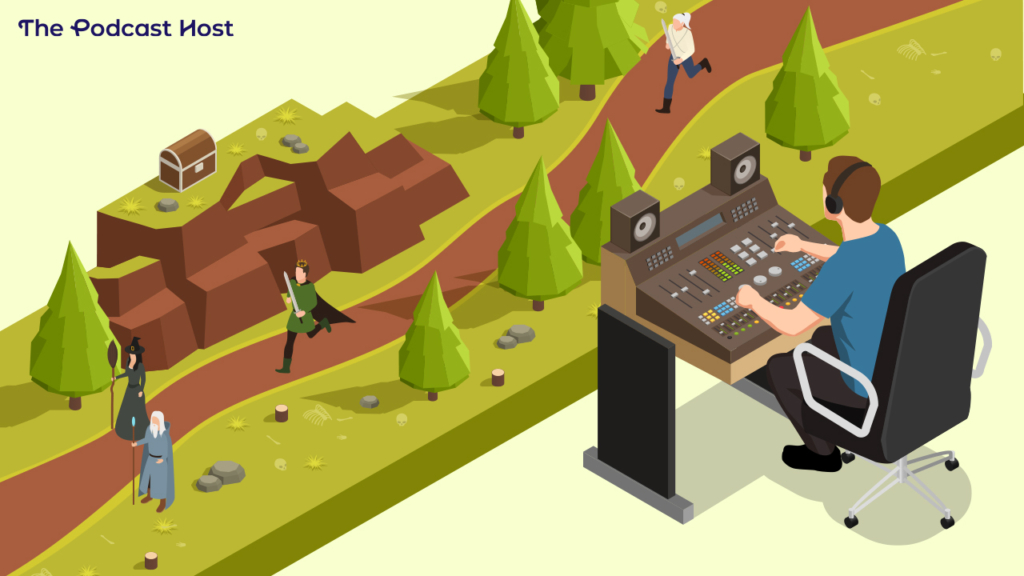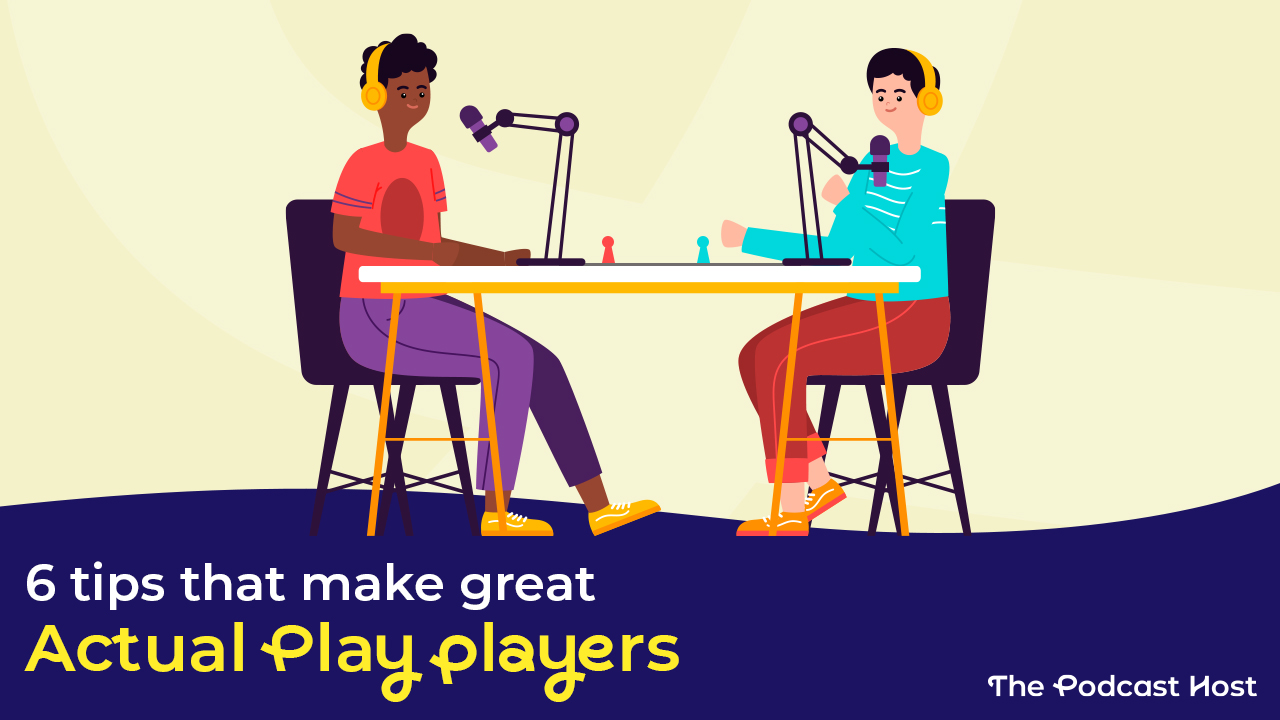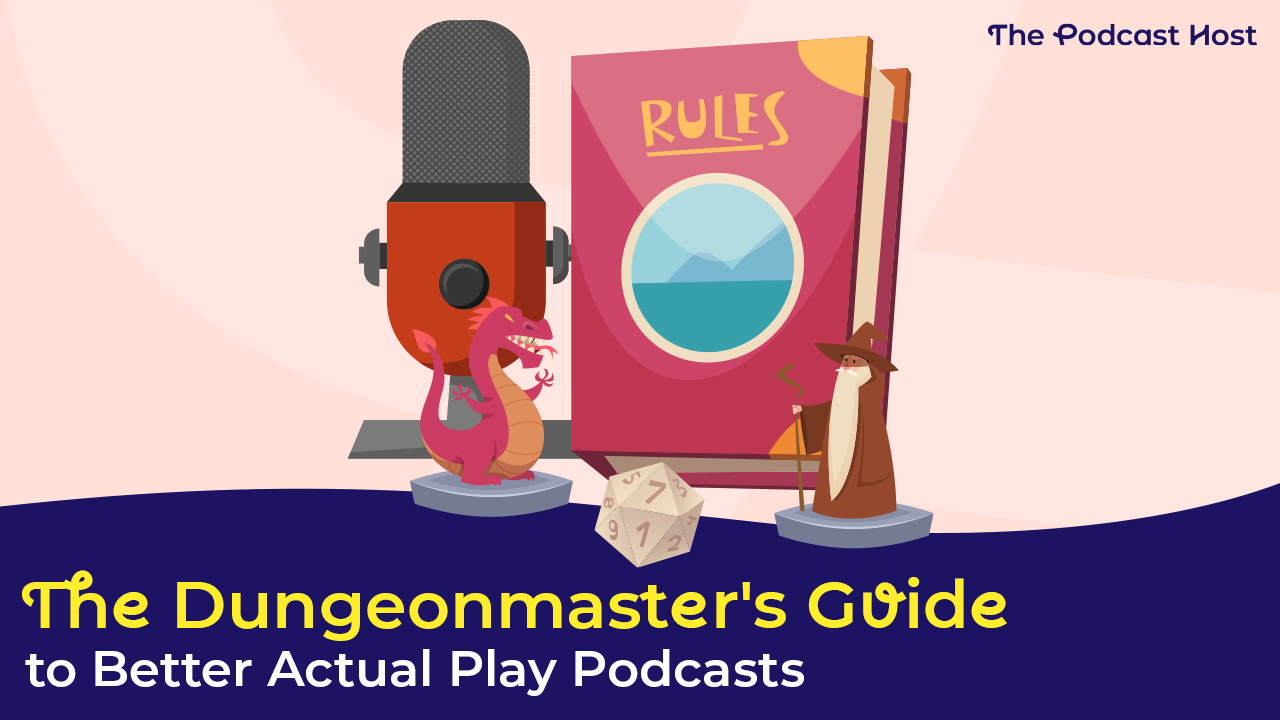6 Differences Between Scripted Fiction and Actual Play Podcasts
Many moons ago, I responded to a Reddit post about audio dramas and actual play podcasts. There seemed to be a big misconception about the amount of work an actual play requires and that an actual play is a lesser form of an audio drama.
Well, I might have gotten a little heated in my response, but I think I’ve grown since then. An actual play is audio and drama; if you disagree, please go to the comments and bump up the SEO algorithm for the website by engaging with the post. Thank you. (Spoiler, I won’t respond).

By Volonda of The Lucky Die
Hem Brewster is a Brit living in Iceland, Hem GM’s actual play podcasts, and is also the lead producer at Blighthouse Studios. They’ve also been known to voice act in the odd podcast.
Why do I mention this? The post that got me irate made me think about the differences and similarities between audio drama and actual plays. It made me really appreciate what it takes to make a good actual play and the work that goes into scripted fiction. It’s clear that both forms of storytelling, at least the good ones, require a lot of behind-the-scenes work.
Scripted fiction and actual play podcasts have their own unique challenges and differences. Let’s take a quick tour through the ones that jump out to me the most. Hopefully, you’ll emerge on the other side with a greater appreciation and appetite for both.

1. Control
Scripted Fiction – The only surprises are the ones the writer makes, and if it doesn’t work… hey, just start the script again. There is time (for the first season, at least) to make this 100% perfect. Plot twists are of the writer’s making and can be set up with precision and control for a perfect payoff. The writer is responsible for literally everything, however, from the big murder down to the chocolate or banana milkshake.
Actual Play Podcasts – The GM (game master) needs to know practically everything about the world in which the story is set. They do have to react… on the fly… when a character refuses to go through the door marked ‘PLOT’. The GM can set up the seeds of a plot twist, but the players, and the dice, might ignore or create their own plot twists. There is very little control. And you usually have only one shot as a GM to get it right.
Related Article
6 Tips That Make Great Actual Play Podcast Players
Unlike being an actor, there are additional skill sets when it comes to being a cast member in an actual play podcast. Improvising, knowing the basic rules, and playing well with … Find out more »
2. Casting
Scripted Fiction – The production team can cast the perfect person: they know who they want, and they already know how long they’ll need to engage the actor. As a producer, you’re not relying on actors to create content; they’re performing yours. It’s also easier to budget costs and create a schedule when you know what’s coming.
Actual Play Podcasts – The unique aspect of casting for an actual play is finding folks that can work together and improvise good stories. Once you cast a player or GM, you could be with them for years. And you’re relying on them to create the content of the podcast. A wrong choice could make recording difficult or impossible.
3. World Building
Scripted Fiction – Research, research, research! Not everyone can do this kind of work when making a story – full props to script writers, you’re heroes. Researching obscure languages one day and what the weather is like the next. All for accuracy.
Actual Play Podcasts – A GM might need to create their own laws of physics, cultures, or phases of the moon. Research is still necessary, and being prepared is essential. But, if the story goes off in another direction, it might never see the light of day.
4. Flexibility
Scripted Fiction – Flexibility for a script writer is entirely up to the author. Can they adapt if an actor brings a new energy or take to a character? Can it adapt to a casting change? Yay, or nay on ad-libs? Most flexibility comes down to minor changes in scripted form or where real-life events force change.
Actual Play Podcasts – A GM has to be able to change the story on a whim. A plot that has been months in the making might need complete change from the result of a single dice roll. This is both daunting and exhilarating. A story told this way could truly be as much of a surprise to the story keeper as the players and audience.
5. Dialogue
Scripted Fiction – A writer has to have everything scripted: for the dialogue to make sense and for each character to have their own voice on the page. Everything can be controlled, each line well thought out, and many meanings applied. Foreshadowing can come from anyone, and every word can have meaning.
Actual Play Podcasts – With the exception of the GM, the lines of dialogue are always reactionary and said in the moment. Clever or witty lines are spontaneous and it is raw. It isn’t scripted. A line uttered in anger can really be said in anger because that’s where it comes from. There can be a lot of fluff, missed opportunities and imperfect deliveries as an actor reacts in the moment.

6. Engagement between Crew and Audience
Scripted Fiction – An actor as a person is removed from the show as they are never made to reveal themselves in order to tell the story. And unlike an actual play, they do not need to invent character motivations, make dialogue or even make the “right decision”. They are free to focus solely on the performance, and a good performance can really pull an audience in.
Actual Play Podcasts – The actors are also players, making decisions and having to improvise. So if a show includes a portion of the table talk, it can add another layer to the listening experience. Good Actual Plays have that ‘oh hell yeah’ moment as the audience reacts as the cast does. What they’re hearing can be imperfect, but it’s usually real, and an audience responds to that.
Summary: Chaos Vs Control
The biggest difference between scripted fiction and actual plays is the difference between chaos and control.
There are a lot more variables in actual plays. Not everyone can adapt easily to this, but the benefit is shared storytelling. Multiple voices create a unique story. It can feel more genuine as the reactions to the roll of a dice, the tension, and the drama waiting on success, are all real.
In scripted fiction, on the other hand, you have to know everything. You can craft a very clever and compelling story. Every word can have meaning. Actors are phenomenal folks – they can perform everything as you intend, and people resonate with a well-told and performed story.
Really, I have absolute respect for anyone who can write a script. It’s blooming hard! You’re heroes. But I also know that not everyone can run a game and still maintain an engaging plot. I’m just glad there’s space at the table for both.
Related Article
The Dungeonmaster’s Guide to Better Actual Play Podcasts
So you want to make an Actual Play podcast so good that its known throughout the podcasting realm? You’ve come to the right place. Find out more »



